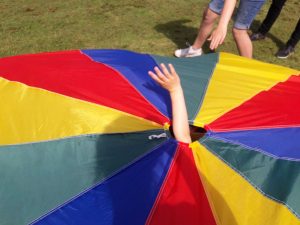At this time of year many children are involved in competitions of all sorts. Team games are coming towards finals and there are competitive sports, gymnastics and athletics events, both local and national, for all age groups. Music and dance competitions take place as another academic year draws to a close and classes prepare for their summer break. In schools there are sports days and end of term competitions of various sorts, and while all children are acknowledged for their participation and effort, there will still be winners and losers and undoubtedly some disappointment for those who don’t win ‘the prize’. Many would argue that the failure to deal with disappointment is a good enough reason to ban competition for children. But is this the right approach? Is it not good for children to have some competition in their lives so that they learn to experience feelings of failure, of losing out to another, and begin to manage these feelings adequately? Children need to be supported in negotiating difficult emotions all the time, and nowhere more so than in handling all the emotions involved in disappointment. Whether we like it or not, disappointment is part and parcel of the world we live in. By allowing children to experience disappointment, we can help them to build character and resilience, develop healthy attitudes about winning and losing, learn to handle difficult experiences and become effective problem solvers.
Resilience has been defined as the ability to bounce back, to pick up the pieces in the face of disappointment or adversity. It has been claimed that today’s children lack resilience, that they cannot cope well with failure or disappointment and therefore should be shielded from life events which bring up these unpleasant feelings. But are today’s children really not as resilient as their counterparts in the past, and if not what can we as adults do about the situation? How do we build children’s resilience? Sports psychologist Dr. Olivia Hurley has encountered many sportspeople who have met with serious injuries or setbacks in their careers and has often been asked how she helps people deal with such losses or life changing injuries. Among the top tips for resilience building which Dr. Hurley gives is the urge to aim for excellence, not perfection. When working with children we can continually encourage them to try to reach their personal best rather than always have to be a winner, to challenge themselves rather than pit themselves against others all the time, with one aim – to come out on top!
Dr. Hurley also suggests that viewing setbacks as opportunities for growth, having a positive mindset and knowing what you want to achieve and why are important aspects to resilience building. Are children trying to achieve the top prize because it is what they want for themselves or is there subtle pressure from others? Are they trying to reach their own or other people’s expectations? This might be a question parents could consider in trying to develop resilience in the face of inevitable disappointments. In discussing resilience, Dr. Hurley also exhorts people to take the time to recharge,
‘Resilience is about working hard, stopping, recovering, and then getting going again’. (www.independent.ie, Life Health and Wellbeing)
This is an important message for those who feel that they need to keep going, pushing themselves harder and harder. A well timed break, even if it’s just a 10 minute fresh air break from study, could make all the difference to future performance.
Harvard University Centre on the Developing Child argues that, ‘The single most common factor for children who develop resilience is at least one stable and committed relationship with a supportive parent, caregiver, or other adult’, and also suggests that ‘adaptive skill-building’ is important as a foundation of resilience.
Part of our wellbeing programme in school focusses on building resilience in children so that they can row with the currents, successfully manage the ups and downs of life. Through mindfulness practices, ‘taking a moment’, and talking through difficulties and issues, we hope to give children a range of strategies and coping mechanisms which they can use for themselves when faced with disappointments and adversity.
All of this resilience building must start when children are young. Through the Aistear programme in the Early Years curriculum, play is used as a vehicle for much valuable learning, not least that of learning how to build resilience. Through the numerous learning experiences and learning opportunities of the Aistear curriculum adults can provide children with a ‘box of tools’ to use when things don’t go their way, an inevitability in any play situation!!
“Life is full of challenges and struggles. Therefore, being flexible and having a positive outlook on learning and on life is crucial. All these experiences help children to become resilient and resourceful and to learn to cope with change and situations in which things go wrong”. Aistear: the Early Childhood Curriculum Framework, p.16
Through play children can be repeatedly guided to an appreciation of the values of turn-taking and compromise and can learn to celebrate the achievements of others, in my view one of the best skills of resilience building.
In Aistear, one of the learning opportunities for young children is described as, the adult appreciates children’s efforts, identifies their individual strengths and abilities and helps them to cope and to try again when they experience failure. With an increased awareness of, and emphasis on, mental health today, it is incumbent on all who work with children and young people to help them build resilience and recognise their own inner strengths so that they can meet the ups and downs of life more successfully without turning to artificial means of support.
Kenneth Ginsburg, M.D., MS Ed, FAAP, a pediatrician specializing in adolescent medicine at The Children’s Hospital of Philadelphia (CHOP), has written a book entitled, A Parent’s Guide to Building Resilience in Children and Teens: Giving Your Child Roots and Wings. Dr. Ginsburg talks of the 7 ‘Cs’ of resilience and identifies some ways in which parents can help their child recognise their abilities and build on their inner resources. He describes the 7 Cs as:
- Developing competence by helping children focus on individual strengths, empowering children to make decisions, by recognising that all children are different and not comparing one sibling to another
- Developing confidence by focusing on the best in each child and recognising when a child has done well but not pushing a child to take on more than he or she can realistically handle
- Developing connection by having close ties to family and community which create a sense of security for the child. Dr. Ginsburg advocates spending some discrete family time together and urges families to address conflict openly to resolve problems
- Developing character by demonstrating a solid set of morals and values which a child can live by, and avoiding the use of hurtful, racist or hateful statements
- Developing a sense that they have a contribution to make to society and by encouraging generosity and creating opportunities for children to contribute in the world
- Developing coping strategies by modelling these on a regular basis and guiding children to develop positive and effective coping strategies of their own, while not condemning them for negative behaviours while they learn
- Developing a sense of control by helping them to realise that they can often control the outcome of their decisions and understand that life’s events are not purely random and that most things that happen are the result of another individual’s choices and actions.
Source: Healthy Children Magazine
While we cannot guarantee resilience in every situation, by teaching resilience techniques we can help children to become better problem solvers so that they can figure out what to do in any given situation, and they will be more likely to ask for help. Teaching resilience is a much better strategy for parents than trying to pre-empt difficulties and having children avoid the pitfalls. If we allow appropriate risks we allow children to learn and grow in resilience. If we equip children with the skills to handle the unexpected they will inevitably become more capable, competent and more contented young people as a result.


Recent Comments